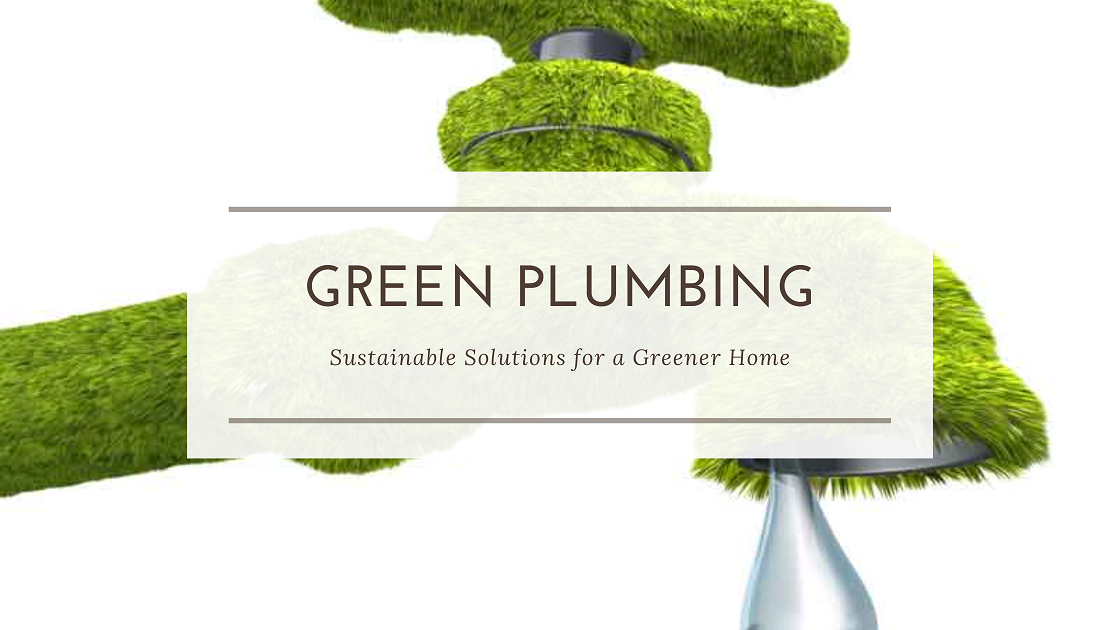The world is moving towards sustainability, and we need to adopt eco-friendly practices to save the environment. Plumbing systems in our homes are one of the biggest contributors to water wastage and pollution. But with the advent of green plumbing, we can make our homes sustainable and reduce our carbon footprint. Green plumbing is all about using sustainable plumbing practices, products, and technologies that conserve water, reduce waste, and save energy. In this blog, we will explore the various green plumbing solutions suggested by plumbing company in Katy that can help you make your home eco-friendly.
Low-Flow Fixtures
Low-flow fixtures are a great way to save water and reduce water bills. They are designed to use less water while maintaining the same performance as traditional fixtures. Low-flow fixtures include low-flow toilets, faucets, and showerheads. A low-flow toilet uses only 1.6 gallons of water per flush, while traditional toilets use around 3-5 gallons per flush. Low-flow showerheads can save up to 50% of water without compromising the pressure. Low-flow faucets can save up to 30% of water usage. By installing low-flow fixtures, you can reduce your water usage by up to 60%, which is a significant saving for you and the environment.
Greywater Recycling
Greywater is the wastewater generated from washing machines, showers, and sinks. Instead of letting this water go down the drain, we can recycle it for other uses like watering plants or flushing toilets. Greywater recycling systems can be installed in homes to collect and treat the greywater for reuse. By reusing greywater, we can reduce our water bills and save freshwater resources. Greywater systems can reduce household water usage by up to 50%. It also reduces the strain on septic systems and reduces the load on municipal wastewater treatment plants.
Tankless Water Heaters
Traditional water heaters store hot water in a tank, which consumes a lot of energy to maintain the water temperature. Tankless water heaters, also known as on-demand water heaters, heat the water only when it is required. This results in significant energy savings as there is no standby energy loss. Tankless water heaters are more efficient than traditional water heaters and can save up to 30% of energy costs. They are also smaller in size and can be installed in any part of the home.
Solar Water Heaters
Solar water heaters are an eco-friendly alternative to traditional water heaters. They use solar energy to heat the water, reducing the reliance on electricity or gas. A solar water heater consists of solar panels, a storage tank, and a backup heating system. The solar panels collect the energy from the sun and transfer it to the water in the storage tank. If there is not enough solar energy to heat the water, the backup system kicks in. Solar water heater repair Katy cost is low as compared to others and it can save up to 70% of energy costs and reduce greenhouse gas emissions.
Pipe Insulation
Pipe insulation is a simple and cost-effective way to save energy and reduce heat loss. Uninsulated pipes can lose up to 40% of the heat, resulting in higher energy bills. By insulating the pipes, we can reduce heat loss and improve the energy efficiency of the home. Pipe insulation also prevents the pipes from freezing during the winter months. Insulating pipes is an easy DIY project that can be done with minimal tools.
Composting Toilets
Composting toilets are an innovative solution to traditional toilets that use a lot of water. These toilets use little to no water and instead rely on natural processes to break down waste into compost. Composting toilets can be a great option for rural homes, where there is no access to a sewer or septic system. They are also great for reducing water usage and conserving resources.
Smart Water Meters
Smart water meters are an advanced technology that can help homeowners monitor their water usage and identify wastage. These meters can provide real-time data on water usage, detect leaks, and send alerts to homeowners when there is a water-related issue. Smart water meters can help homeowners make informed decisions about water usage and reduce their bills.
Recycled Water Systems
Recycled water systems are another innovative solution to conserve water. These systems collect wastewater from sources like showers, sinks, and washing machines and treat it to a standard suitable for non-potable uses. The treated water can then be used for irrigation, flushing toilets, and other non-potable uses. Recycled water systems can significantly reduce the demand for freshwater resources and save money on water bills.
Green Drain Cleaners
Traditional drain cleaners contain harsh chemicals that are harmful to the environment and human health. Green drain cleaners, on the other hand, use natural and eco-friendly ingredients to unclog drains. These cleaners are non-toxic, biodegradable, and safe for septic systems. Green drain cleaners are a great alternative to traditional cleaners and can help maintain a clean and healthy plumbing system.
Conclusion
In conclusion, green plumbing is an essential part of a sustainable home. By adopting eco-friendly plumbing solutions, homeowners can reduce their carbon footprint, conserve resources, and save money on utility bills. From low-flow fixtures to solar water heaters and smart water meters, there are several innovative solutions that can help make our homes more sustainable. There are some simple steps to improve your water heater’s efficiency and avoid costly repairs, also make it eco friendly. By making a conscious effort to adopt green plumbing practices, we can do our part in protecting the environment and ensuring a sustainable future for generations to come.

